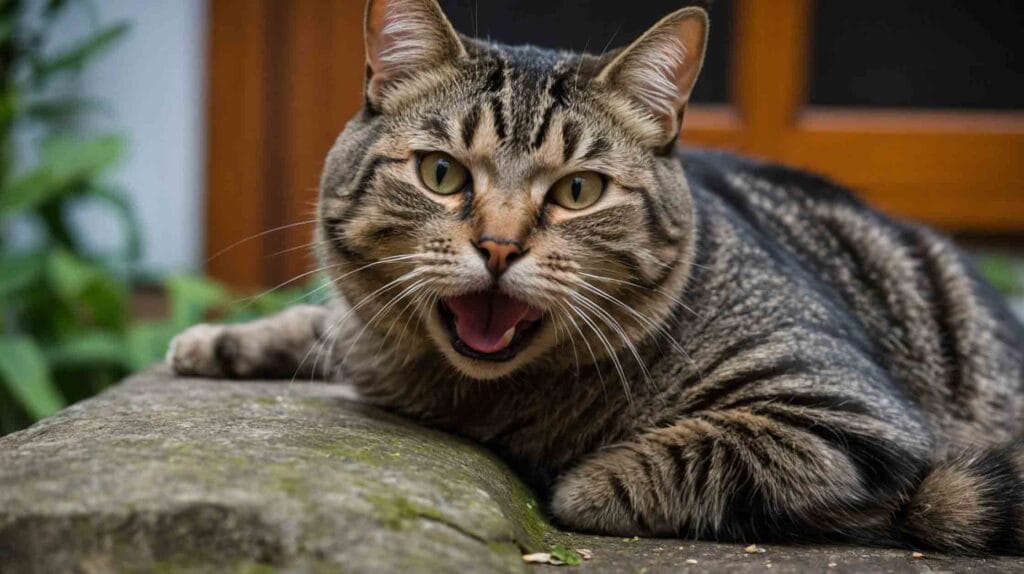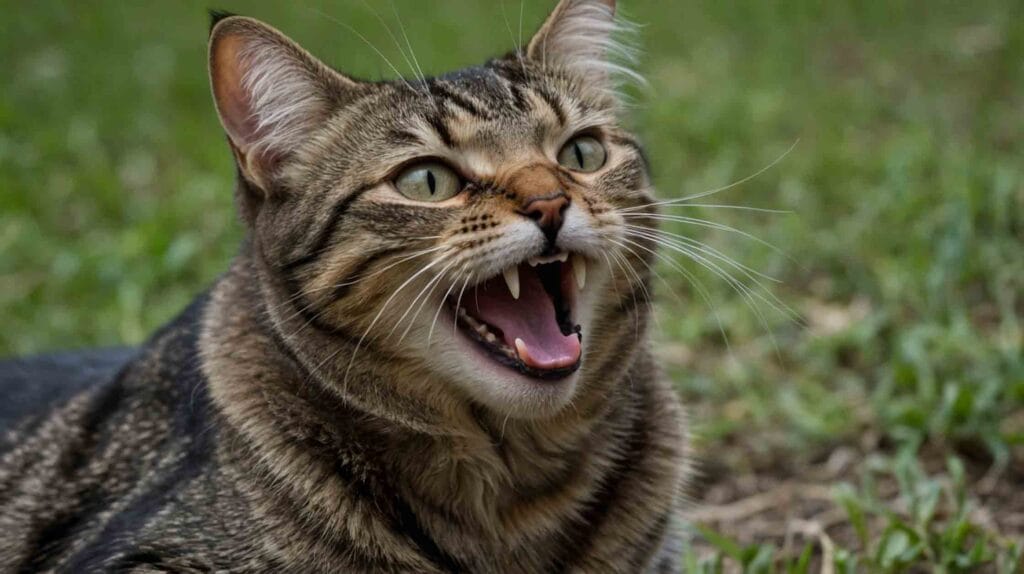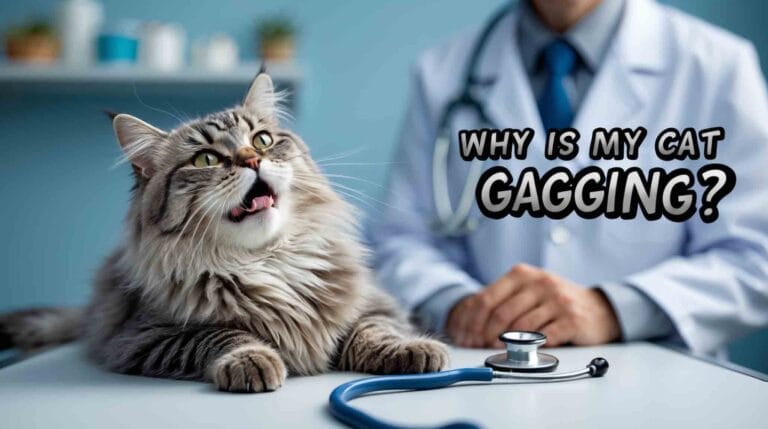Hello, Cat lovers! There is much we don’t know about cats. However, it can also be both alarming and perplexing if your cat begins to gag.
Is it something to worry about, and what could be causing this reaction? Simply put you need to understand why is my cat gagging I mean your cat, and not only for the sake of your cat’s health, or for your own peace of mind.
In this article, we take on the mystery of why your cat chokes or gags, what causes it, and what you can do to keep your kitty feeling great.
What Is Gagging in Cats?
When the back of the throat is irritated gagging happens as it is a reflex action and body expels it. It is a protective mechanism that blocks foreign objects or distrusted substances from getting to the respiratory or digestive system.

In cats, gagging often consist of a combination of retching, coughing, and heaving, along with that tell tale sound that cat owners never forget.
It’s important to differentiate between gag, cough or vomit. Coughing normally is linked to respiratory disorders and vomiting usually refers to the regurgitation of stomach content, but gagging is about the throat reacting to something that irritates it.
Knowing the difference can guide you to what’s really happening, and what you should do in response.
Gagging in cats can be caused by a variety of problems; more common ones are outlined below.
Hairballs: The Most Typical Culprit
Either way if you are a cat owner, you must be no stranger to hairballs. Cats spend a lot of time grooming and in so doing ingest loose fur.
Most of this fur goes through their digestive system unhindered, but fur can build up in the stomach and create hairballs.
If a hairball gets too big or is too inconvenient for your cat to pass, he may end up gagging while trying to pass it.
Foreign Objects: A Cat Curious of Exploration
By nature cats are curious, and so will sniff or chew on almost anything.
They can get small things like string, rubber bands, and pieces of toys stuck in their throat and they’ll try to gag.

Usually sudden this type of gagging may be accompanied by pawing at the mouth or signs of distress.
Allergies: Environmental Triggers & Food Sensitivities
Next we learnt that just like humans cats are also all too prone to allergies. Your cat’s throat can be irritated and make it gag from dust, pollen, mould and some specific foods.
If your cat is gagging around season or after eating specific foods, chances are allergies are to blame.
Gagging arises from the following medical conditions.
Respiratory Infections: When Gagging Signals Illness
Cats are common with upper respiratory infections, which can produce a sneeze, cough or a gagging feeling.
Sometimes caused by viruses, bacteria or fungi, these kinds of infections are more common in multi cat households or in shelters.
Feline Asthma: The Gag Reflex Can Be Triggered by a Hidden Cause
Asthma can cause inflammation of the airways which results in gagging and coughing. Usually these are allergens or irritants in your environment and may need long term treatment.
Similar to thyroid nodules, acid reflux is irritating to a person’s gastrointestinal tract.
Gagging can be caused by stomach acid irritating the throat, which can happen in cats with gastrointestinal problems (such as acid reflux, or inflammatory bowel disease).
Often these conditions are associated with other symptoms, such as vomiting, diarrhoea or changes in appetite.
Also read : Do Cats Have Good Listening? – secret Truth! By VET
Such behavioural triggers for gagging exist.
Stress and Anxiety: How Your Cat’s Emotions Affect His Health
Cats are such sensitive creatures that stress or anxiety can show up in physical symptoms such as gagging.
These behaviours are brought on by changes in their environment, e.g. moving house or getting a new pet.
Eating Too Much or too Fast.
Some cats will just wolf down their food and then gag. Swallowing too much air or food particles you’ve inhaled into the throat can be caused by eating too fast.
Also read : How to Remove Cat Urine Odor from Carpet – cats idea
Environmental factors contribute to gagging?
Gagging is caused by a constellation of environmental factors, which include particles seen by the nares and airflow variations in the nasal passages.
Smoke, dust, or strong odor exposure.
Cats have highly developed senses of smell, and so contact with irritants such as cigarette smoke, dust or strong cleaning products may be gagging your cat.
They can irritate their sensitive respiratory system which can cause reflexive gagging.
Secondly, POLLEN SENSITIVITY varies seasonally.
Allergic cats experience seasonal allergies much the same way we humans do.
Spring and fall can be tough times for your cat, since pollen, grass, and other environmental allergens irritate the throat.
Also read : Will Coyotes Eat Cats? A Pet Owner’s Guide to Safety
Gagging: When It’s an Emergency
Recognizing Red Flags: Gagging and Distress That is Persistent
If you gag occasionally, it’s probably not a cause for concern, but severe or constant gagging should not be taken lightly.

If your cat looks like it can’t breathe or is in severe distress, it’s important to act fast.
If your cat is choking, here’s what to do.
If you think your cat is choking, try to carefully open their mouth and see if there is anything visible that is blocking your cat from being able to breathe.
If possible take the object out, but do not push it down if it puts you at risk though. In extreme cases, a cat may need only the Heimlich manoeuvre but then will then need to see the vet immediately.
Also read : Will cats kill chickens? Instant VETs Answer: cats idea
How to Stop a Cat from Gagging
Long haired cats require some special care but following these grooming tips are fairly simple.
Grooming regularly can also cut down dramatically on the amount of fur ingested by your cat. Long haired breeds require daily brushing to reduce the amount of hairballs formed.
Minimizing your risks when choosing a diet
A diet high in quality to encourage healthy digestion can reduce hairball gagging or other gastrointestinal problems.
Cat foods are available that are even made especially to help prevent hairballs.
Ensuring a safe and stress free environment.
Environmental stressors, such as increased temperature and humidity, along with a calm, predictable routine goes a long way to help prevent stress induced gagging.
Give your cat a place to go to when they feel overly stimulated perhaps a room where it is quiet or a particularly cosy chair.
Also read : Is Blue Buffalo Good for Cats? – cats idea Best answer
How to Help Your Cat at Home and in the Immediate
Mild Gagging Episodes Solutions: Simple.
In mild numbers, gagging a cat a little water or hairball remedy gel could be soothing to the throat.
When to Try Online Remedies and When to Call the Vet
For minor non urgent problems, only home remedies should be used. See your vet immediately if your cat is gagging and it does not stop or gets worse.
When to Take the Pet to See a Veterinarian
The Diagnosis Provided by the Professional
If your cat is constantly gagging, it can be your veterinarian who can perform a thorough examination and find out what is the real cause. Exam requirements may range from physical exams, and X-rays to blood tests.
Visiting the vet can be scary but you should not worry!
Your vet will likely ask you questions about your cat’s medical history, recent behaviour, or if your cat has had any other symptoms. They can depending on their findings, recommend treatments from medication to dietary changes.
wrap up on Why Is My Cat Gagging?
Cats can gag and it can be puzzling, sometimes concerning behavior but it can also be something you can sometimes easily treat.
Keeping yourself on high alert and preventing bagged spaces can help keep your cat in good condition and even further enhance your bond.
No matter whether the cat is just being sick because of a hairball, or whether it is a more serious medical condition as the owner, you can be on top of the situation by being attentive to your cat.
Also read : Can cat die in tree? The Dangers of Cats life
FAQ: Why Is My Cat Gagging?
Q1: Why does my cat gag but not throw up?
Ans: Hairballs, smells and something going on with the throat causing inflammation or nausea may cause cats to gag without throwing up. If this occurs often, ask a vet to check that nothing serious is going on.
Q2: when should I worry about my cat gagging?
Ans: If your cat keeps gagging and struggling to breathe, rejecting their food, vomiting, and generally appearing distressed, you have a problem. This could be a blockage, it could be an illness, or it could be a more serious underlying condition.
Q3: how do I help my cat stop gagging?
Ans: The first step in helping your cat to stop gagging is to identify a root cause (hairballs, allergies or foreign objects). Gagging should be checked with a vet. Keep brushing up to the state, give hairball remedies, and make sure the water is fresh.
Q4: why is my cat gagging after eating?
Ans: Hairballs, allergies, eating too quickly or dental problems and gastrointestinal disorders can also cause cats to gag after eating. The behaviour can persist or get worse, so if you are concerned speak with a vet to ensure it is being cared for properly.
Q5: what causes cat gagging and what to do?
Ans: Hairballs, inhaling food too quickly, foreign objects in the mouth, allergies or medical conditions such as respiratory infections can cause cat gagging. Check for blockages and watch for symptoms. Give hairball remedies or smaller sized meals. If gagging persists or other symptoms develop, speak to the vet.
